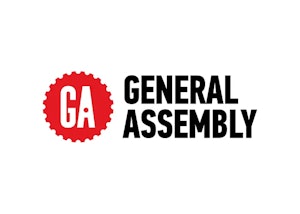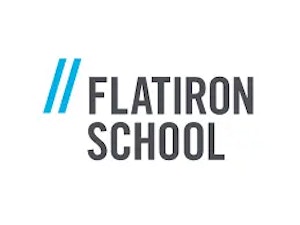Data science bootcamp or data science certificate program?
The way we see it, all bootcamps are certificate programs — students who successfully complete one are awarded a certificate — but not all certificate programs are bootcamps. In general, you can expect a data science bootcamp to distinguish itself from a regular certificate program by being:
Longer: While some non-bootcamp data science certificate programs can be completed in as little as 3 hours a week over the course of several weeks, data science bootcamps generally require a significant time commitment, generally three or more months of 20+ hours of instruction per week. Of course, a bootcamp won’t have nearly the time commitment of a degree program.
More intensive: In line with the bigger time commitment, data science bootcamps will also offer more intensive instruction than their non-bootcamp counterparts. While some non-bootcamp certificate programs offer at best a cursory overview of the different aspects of data science, you can expect a bootcamp to dive deeper into more topics.
More expensive: As would be expected with a longer run-time and higher intensity, a data science bootcamp will generally cost more than a non-bootcamp certificate program, with tuition often running in the tens of thousands of dollars, not the hundreds and thousands you would expect with a non-bootcamp certificate. At the same time, bootcamps offer a more affordable option than most degree programs.
Geared to different audiences: As we detail in our guide to data science certificate programs, certificate programs have a variety of use cases, including serving as a low-cost, low-time way to see if a data science career is appealing, helping professionals add new skill sets, or providing background in the field for managers and executives.
Data science bootcamps, by contrast, only really have one purpose: to help aspiring data scientists gain the skills necessary to land an entry-level job as a data scientist. To this end, data science bootcamps also offer extensive career services to help students land job offers quickly.
Who are data science bootcamps for?
So who are these aspiring data scientists for whom a data science bootcamp can serve as a jumping off point to a new career? The good news is that it can really vary.
Some bootcamp attendees might have existing backgrounds in STEM fields such as information technology (IT), data analytics, computer science, computer engineering or applied statistics, but many will come from the social sciences or humanities. While some might already have a bachelor’s degree, for many attendees a data science bootcamp is the first experience of post-secondary (post-high school) education.
Some programming experience or experience with statistics will typically help a student get more out of a data science bootcamp, but this is not essential. In fact, some programs even offer self-paced pre-course modules in these areas to help those with less experience hit the ground running.
Regardless of background, attendees of data science bootcamps are united in their goal: to make a quick but lasting change in their career without as much time and money as it would take to pursue a data science bachelor’s or master’s degree.
What are the different ways you can attend a data science bootcamp?
Aspiring data scientists considering a data science bootcamp will have options when it comes to the camp’s modality and schedule.
Self-Paced Online
Self-paced online bootcamps offer pre-recorded learning content that can be accessed asynchronously, so attendees have the flexibility to study when it suits them and progress on their own schedule.
While some self-paced online bootcamps will be open-ended, meaning that students can take as long as they want to complete the curriculum, others will have concrete start- and end-dates, potentially aligned with exams. Many will offer one-on-one mentoring opportunities in addition to the course content, which can happen live through video chat.
Because they offer asynchronous learning, self-paced online bootcamps are a great option if someone wants to study part-time, either because they wish to continue working or have familial obligations.
Live Online
Instead of pre-recorded videos, live online data science bootcamps feature real-time instruction from faculty through a video conferencing service. To encourage student-teacher and student-student interaction, these bootcamps are often cohort-based, meaning classes are capped at a relatively low number of students, usually around 35.
Because instruction is synchronous, there are sometimes opportunities for group projects in addition to the traditional independent capstone project. Live online bootcamps can be offered both part-time and full-time, but because students learn in real-time, they will have to pick an option at the outset and stick with it.
Hybrid Online & In-Person
Hybrid online & in-person data science bootcamps pair synchronous and/or asynchronous online instruction with in-person learning and events. These are great options for aspiring data scientists who want opportunities for in-person interaction and networking but also want to have the flexibility to complete most of the program from their couch. As with live online bootcamps, hybrid bootcamps allow for greater collaboration between students on projects.
While part-time study is possible with hybrid bootcamps, the in-person component will usually be inflexible and full-time, if only for a brief period. This means that attendees will have to make the appropriate accommodations, either by asking for time off from work or finding coverage for other obligations.
If online is your preferred learning modality, check out our guide dedicated to online data science bootcamps for a deeper dive.
In-Person
The option most resembling traditional learning, an in-person bootcamp is just that: instruction that takes place in a classroom with a live instructor. As would be expected, students often have greater opportunities to interact than they would in self-paced, and even live online bootcamps.
Bootcamp providers often offer part-time and full-time options for in-person bootcamps to allow both those who need flexibility and those who want to maximize the efficiency of their study to attend.
What core topics do data science bootcamps cover?
While there is certainly variation, the core curriculum of a data science bootcamp will be consistent across the board. Students can expect to cover the following:
We’ll go into each in detail.
Fundamental computer science skills
Either in self-paced prerequisite work or during the course itself, students will learn how to write code using SQL, Python, and/or R programming languages. SQL (usually pronounced “sequel”) is a programming language used to manage data in databases.The R programming language was instead created to enable statistical computing and graphics. Python is a general-purpose programming language that is a frequent favorite in the data science community because of its great libraries for data science and machine learning, including Pandas, TensorFlow, and Keras.
For more, head to our data science programming language primer.
Statistical modeling
Statistics — the collection, organization, and analysis of numerical data — and probability, the calculation of the likelihood that a particular event will occur — are crucial for data science because they allow data scientists to learn from existing data sets and use relevant insights to predict future outcomes.
In a data science bootcamp, students learn methods of statistical modeling and predictive analytics that will allow them to develop and test hypotheses from data and use linear regression to make predictions.
Machine learning fundamentals
The discipline of machine learning focuses on developing algorithms that can teach themselves to perform complicated analysis and other tasks much more quickly and efficiently than a human could. Especially when big data sets are involved, machine learning is essential for data science.
Bootcamp students can generally expect to cover elementary machine learning algorithms; machine learning methods like unsupervised learning, supervised learning, reinforcement learning, and deep learning with neural networks; and machine learning libraries like PyTorch and Pandas.
Oftentimes, students also learn the basics of linear algebra, a discipline of applied mathematics focusing on the use of linear equations and matrices to model natural and artificial phenomena and compute with these models.
Data management
Data science bootcamp students will also learn the fundamentals of data management. Data management is crucial to ensuring a viable, efficient, and effective data pipeline — essential to any data science project.
Core data management skills taught in a bootcamp generally include web scraping, data cleaning, data mining, cloud computing with services like Amazon Web Services (AWS), and basic data engineering.
Data visualization
While the title would suggest that data scientists spend most of their time in deep analysis of data, a large part of the job involves communicating findings of this analysis to interested stakeholders, many of whom aren’t as technically or data-savvy. Crucial to this communication is data visualization, which puts data and the findings of analysis in a more easily digestible form.
In a data science bootcamp, students generally practice their data visualization skills using Tablea, an industry-standard software that allows for the creation of elegant and informative dashboards, among other visualizations. Other data visualization softwares sometimes taught include Matplotlib and Seaborn.
As mentioned above, students are often given the opportunity to apply all of these skills through a capstone project at the end of the bootcamp.
How much does a data science bootcamp cost?
The cost of a bootcamp varies depending on the institutions and the type of bootcamp. Generally, bootcamps that are full-time, live, and/or in-person will be more expensive, while part-time and self-paced online bootcamps will be more affordable.
The average bootcamp cost $11,727 in 2020, far less than a traditional degree program in the US, though some data science bootcamps can cost as much as $18,000. It’s worth noting, however, that there are a contingency of self-paced options like Coursera, DataCamp, Udacity, and Udemy that, while not truly “bootcamps,” offer extensive data science training for much less. You can take courses for credit on Coursera, for example, for as little as $39/month.
Some bootcamps offer financing, installment plans, or income-share plans where you pay back a fraction of your income once you get a job. Others have guarantees that you will get a job offer or you get your money back. While these sound appealing — and they can be — it’s also important to always read the fine print: with financing, installment plans, and income-share plans you can often end up spending much more than you would on tuition up-front, while job guarantees often require strict adherence to a set of job search procedures that, if not followed, void the guarantee.
What kind of positions do data science bootcamps prepare attendees for?
$18,000 is certainly not cheap — to be a good investment, there needs to be a significant return in terms of salary. Luckily, the kinds of roles that data science bootcamps prepare attendees for, mostly entry-level data science and data analyst positions, suggest that for a driven and successful attendee, the tuition for a data science bootcamp will pay for itself over time.
Data Analyst vs Data Scientist
Typically, data analysts will have a narrower scope of work, performing more rudimentary analyses to identify trends from existing databases. According to Salary.com, the salary range for data analysts is $73,002 to $91,552.
Data scientists instead focus more on developing predictive models and other data tools, as well as performing more advanced analytics. According to Salary.com, the salary range for junior data scientists is $80,432 to $101,098.
The differences in the responsibilities of data analysts and data scientists become clearer when looking at the following real-world positions. You can also check out our deeper dive on the difference between a data analyst and a data scientist.




